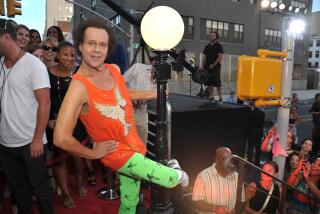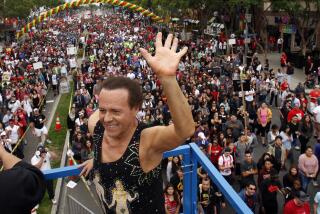Simmons Resurfaces After ‘Digesting’ His Last Takeover
- Share via
Even after a two-year lull in his raiding game, Harold C. Simmons has demonstrated that he can still put fear into the management of potential takeover targets. When the self-made Dallas billionaire passed the 5% level in his Lockheed holdings, it apparently hit a nerve.
On Tuesday, Lockheed quickly threw up more of the defenses that it began erecting against him last December, when he disclosed that he might increase his 0.6% stake in the big aerospace company.
The quiet-spoken Simmons is no one to take lightly, having shown his tough style in a series of uninvited acquisitions that started in 1975.
Since August, 1986, the 57-year-old said Tuesday he had been “digesting” his last major acquisition, NL Industries,--a New York chemicals firm. Until this week, that is.
After disclosing his $150-million Lockheed stake Monday, Simmons also said he has bought lesser but substantial interests in three other major corporations: Chrysler, Paccar and Phelps Dodge. The vehicle for his acquisitions is Valhi Inc., the Dallas holding company of which he owns 88%.
The news set off shock waves on Wall Street, along with speculation about which, if any of the companies, he might have grand designs upon.
In a telephone interview from his 24-acre Santa Barbara villa (one of several residences he owns), Simmons certainly was not tipping his hand.
He said he was “disappointed” that Lockheed unveiled a $500-million employee stock ownership plan--which he called a dilution of stockholder value--as a takeover defense. He said he was evaluating that, plus the company’s new forecast of slower earnings, adding that he “might sell some” of his Lockheed stock.
Simmons, one of the Drexel Burnham Lambert investment bank’s past clients in the “junk bond” business, declined to be drawn out on his intentions about Lockheed or the other three firms. In each case, he said, he has sought federal antitrust clearance to buy more than $15 million worth of stock--”all good, sound investments.”
Simmons accounted for the lull of the last two years by saying: “You got to digest what you’ve got.” He added that he had to “accomplish some objectives” and get “some cash” before taking on something new.
Would he make a major acquisition in the near future?
“You never know,” he drawled without a trace of jocularity. “The world changes every day.”
Is Simmons hard to read?
“He is very difficult to read. By design, it is very hard to read Harold’s M.O.,” a friend, Los Angeles financier Burt Sugarman, said Tuesday. “That’s what he wants.”
Simmons just might be “the brightest investor in the country,” said Sugarman, 50, a former Hollywood television producer who turned to investing a few years ago.
As for Simmons’ low profile recently, Sugarman said: “I don’t think he ever lies low. I think he works all the time. Sometimes things just don’t surface publicly. He is a total nonstop thinker.”
Simmons earned a master’s degree in economics and a Phi Beta Kappa key at the University of Texas, where he also played varsity basketball. An aide said Tuesday that Simmons “still has the same build,” adding: “There is not an ounce of extra fat on him.”
Simmons tries to run his business the same way.
He said he does not object to being called a corporate raider as long as that is understood as someone who “takes uninvited stock positions.” But he said dislikes any implication of “some kind of force.”
Simmons started as a federal bank examiner, then became a bank executive before launching what grew into a chain of 100 drugstores, selling out in 1973. Meanwhile, he invested in insurance companies before starting his takeover moves.
A decade ago, Simmons tried to take over PSA, the San Diego-based airline holding company, but settled for a good profit on his investment, as he has since done with a number of investments, including Sea-Land Corp. in 1985. Besides NL, he succeeded in acquiring Amalgamated Sugar.
Simmons has had a couple of brushes with government agencies. In 1974, a judge found him and five co-defendants innocent of securities fraud stemming from the failure of an insurance firm. However, he paid $500,000 to settle civil charges out of court in what he recently called “the low point in my career.”
And in 1984, the Labor Department sued Simmons for using assets of pension plans under his control to finance takeover bids for Amalgamated Sugar.
More to Read
Inside the business of entertainment
The Wide Shot brings you news, analysis and insights on everything from streaming wars to production — and what it all means for the future.
You may occasionally receive promotional content from the Los Angeles Times.










